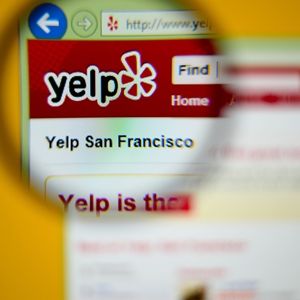
Yelp, online reviews and the future of defamation
August 8, 2016 12:29 pm Leave your thoughts
Following its meteoric rise as the pre-eminent consumer business online reviewing site, Yelp has recently suffered a serious legal blow to its credibility: In the case of Hassell v. Bird, a California appeals court ruled that the site must remove a user's online defamatory reviews targeting a local law firm.
Hassell v. Bird
For background, Ava Bird, a former client of the Hassell Law Group, allegedly published a review on the firm's Yelp business page under the name "Birdzeye B. Los Angeles." The one-out-of-five star review accused the firm of "ma[king] a bad situation worse," and included a number of statements that the attorney Dawn Hassell contested as inaccurate and defamatory. After attempting to contact Bird to work out the situation, Bird enlisted the help of another party to leave several additional bad reviews, fabricating claims of being charged by the firm for documentation in a presumably fictional case.
Hassell sued alleging defamation, trade libel, false light invasion of privacy, and emotional distress, and sought an injunction and damages. The lower court ruling was for Hassell – a default judgment against the unresponsive defendant – and was awarded nearly $558,000 and injunctive relief, including an order that Yelp remove Bird's defamatory reviews from its website.
"Negative online reviews have always been a contentious issue."
This is where things got more complicated than all parties were initially expecting. Even after the final judgment was delivered to Yelp's senior director of litigation, the company attempted to fight the injunction to remove the defamatory review. Yelp appealed the verdict, resulting in the California's First District Court of Appeal affirming the lower court's ruling and once again asserting the importance of the initial judgment.
Yelp, for its part, attempted to paint this loss as an affront to the First Amendment, with Yelp spokesman Vince Sollitto saying it "undermines the free speech and due process rights of consumer reviewers and the online platforms that host their content."
What it means for small businesses
Of course, the findings in this case are nothing new. Negative online reviews have always been contentious, both for businesses and consumers. Even a single negative review on a site like Yelp can act as a black mark that can cripple a business. This has led to consumers holding small businesses hostage by threatening negative reviews, a form of extortion – or worse, scorched earth vengeance – based on a tactic they know will hurt or destroy the business, as the lower court found in the case of Hassell v. Bird. Alternatively, malicious patrons may threaten a restaurant with negative feedback, demanding a free meal as compensation for not writing a bad review. This is basically blackmail, but it is widespread and tacitly reinforced by the review sites refusing to remove negative reviews.
"Small business owners are becoming a target of angry, irrational consumers."
Of course, businesses should be held accountable for their products and services and the knife cuts both ways: over-zealous business have threatened legal action against consumers for leaving bad reviews, to which (ironically) Yelp responds by putting a consumer alert on the business. Still, disproportionately, small business owners are becoming a target of angry, irrational consumers, with Yelp content to stand by – even defend -these reviews.
"It gives those who dislike certain speech – here, a lawyer who was upset at reviews from her clients – the ability to require their removal while denying the website hosting that speech the ability to defend its editorial rights to publish the speech or rebut the claims," Sollitto added after the recent ruling. But to cloak this defense of Yelp's actions in "free speech" is disingenuous.
The future of online reviews and free speech
The First Amendment does not and should not protect defamatory statements, especially malicious ones. Enabled with anonymity that third party Internet Service Providers regularly defend in court, angry consumers regularly make false reports to the Better Business Bureau and on sites like Yelp. The goal here isn't to fix an issue. The goal is to hurt or cripple the business.
Internet speech is an area where the law lags behind technology. Obtaining information from the ISPs in court is a long and involved process. By the time the malicious poster is identified and motions to serve them are drawn up, they could be long gone and the plaintiff could have expended precious resources. In this case, the attorney was "fortunate" in that at least they knew who the posting party was. More often, this is not the case.
Fraudulent negative reviews are no more protected speech than falsely shouting "fire" in a crowded theater. That shout is not protected because its purpose is to cause mayhem, i.e. to hurt, not driven by any socially responsible purpose. Currently, our laws have trouble distinguishing between defamation and protected speech in the context of the internet. Legislation is needed to balance the scales between speech intended and designed to have something fixed, to express an opinion or warn others, and speech made to hurt or destroy.
Categorised in: Business Law, C-Corporations & S-Corporations, Litigation, Starting a Business in Arizona
This post was written by





